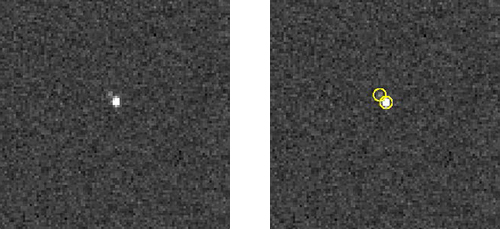NASA's New Horizons has traveled far enough in the seven years since its launch to see the target at the end of the trajectory. The spacecraft's highest-resolution telescopic camera recently beamed back an image of Pluto and its largest moon, Charon, discernible for the first time as two separate worlds.

At least one announcement of this milestone referred to Pluto as a planet, re-igniting the debate over the definition of the "p" word and Pluto's contested status as a member of that category.
Having played a (small) part in the Pluto affair, I would like to share some of the lessons in humility it taught me.
The first came from my older brother Michael, who, upon learning that the International Astronomical Union (IAU) had appointed me to its "Planet Definition Committee," asked, "Why do they want you?"
Maybe it was folly to try to redefine a term already laden with significance. A hand-me-down from the ancient Greek planetai, meaning "wanderers," the word had referred of old to the Sun and Moon as well as to Mercury, Venus, Mars, Jupiter, and Saturn. Modern astronomers needed a more detailed, comprehensive definition, informed by new discoveries of the Solar System's most distant objects plus several hundred "exoplanets" circling stars beyond the Sun. A strict definition, it was hoped, would also decide what to do about Pluto, whose planethood had come under question.
Our committee's draft proposal in the summer of 2006 defined a planet as a body in orbit around a star, and massive enough to be globe-shaped. By our definition, Pluto remained a planet, while several other bodies became planets. These included the asteroid Ceres and a few so-called Kuiper Belt Objects beyond the orbit of Pluto. The census of Solar System planets thus rose to twelve -- with a chance of climbing higher in the light of future discoveries.
Of all the objections raised against our suggestion, the one that surprised me most was the argument that children could not be expected to memorize an unlimited number of planet names.
When our proposal came to a vote at the IAU general assembly in Prague a few weeks later, another qualifier was added by some of the discussants: To be a planet, a round body orbiting a star had to dominate its neighborhood. This was Pluto's downfall, as it orbits in thrall to the planet Neptune, and has failed to clear its path of other small fry.
The official definition reduced the Solar System to eight planets. Some outsiders thought Pluto had been bodily ejected, when in fact it was merely relegated to a separate class of "dwarf planet." But unlike a dwarf star or a dwarf galaxy (each a diminutive version of its type), a dwarf planet is not a planet. This seems a harsh -- even an illogical distinction. As one astronomer lamented, "Is a dachshund not a dog?"
An unfortunate change in the wording of the final definition replaced the word "star" with "the Sun." This means that after years of (still unsettled) debate, we have defined only the worlds of our own Solar System, when a goal of the re-definition process had been the expansion of our vocabulary to embrace the myriad other worlds abounding throughout the galaxy.
Surely the definition needs retooling. Maybe by the time New Horizons arrives in 2015, Pluto will have morphed into a planet again.
